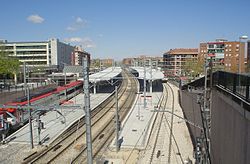Fuenlabrada
You can help expand this article with text translated from the corresponding article in Spanish. (June 2012) Click [show] for important translation instructions.
|
Fuenlabrada | |
|---|---|
| Fuenlabrada | |
| Country | |
| Region | |
| Comarca | Madrid metropolitan area |
| Government | |
| • Mayor | Manuel Robles Delgado (PSOE) |
| Area | |
| • Total | 39.41 km2 (15.22 sq mi) |
| Elevation | 664 m (2,178 ft) |
| Population (2009) | |
| • Total | 197,836 |
| • Density | 5,000/km2 (13,000/sq mi) |
| Time zone | UTC+1 (CET) |
| • Summer (DST) | UTC+2 (CEST) |
| Postal code | 28940-28947 |
| Official language(s) | Spanish |
| Website | www.ayto-fuenlabrada.es |
Fuenlabrada (Spanish pronunciation: [fwenlaˈβɾaða]) is a city and municipality in the Madrid Metropolitan Area, Spain. It is to the southwest of the region, 22.5 km from the capital, and had a population of 197,836 in 2009. The name probably has its origin in Fuente Labrada (Spanish for "carved fountain").
Fuenlabrada witnessed a dramatic population explosion in the 1980s, due to large scale immigration of young workers coming from the capital city and other agrarian regions (chiefly Extremadura, Castilla-La Mancha, Andalusia and Galicia) seeking affordable prices in housing. By 1975, the municipality had already reached a population of 18,442. Foreign workers have also settled in the city, most of them coming from Latin America, Africa, the Maghreb, China and Romania. Famous people from Fuenlabrada include ex-Liverpool and current Atletico Madrid striker Fernando Torres, and Olympiacos F.C. goalkeeper Roberto.
Origins
The first news about Fuenlabrada came out 200 years later after its founding because of an ambitious project promoted by Philip II of Spain. All the cities, towns and villages received a royal order by which they were obliged to answer an extensive questionnaire about everything related to history, geography, economics, demography, customs... It is all about the historic-geographic relations of all the villages of Spain. With the many pieces of information gathered by that questionnaire an accurate report of Fuenlabrada was created in the 16th century.
Transport
Roads
The city is linked with the M-50, A-42, M-506, M-407 and M-409 highways. It is connected as well to the neighbouring towns of Humanes de Madrid and Moraleja de Enmedio through the M-413 and M-405 local roads, respectively.
Metro
Fuenlabrada has good transport connections with Madrid, Móstoles, Getafe, Alcorcón and Leganés through the Madrid Metro line 12 (also known as Metrosur -South Metro Network-), including five stations:
- Loranca.
- Hospital de Fuenlabrada.
- Parque Europa.
- Fuenlabrada Central (Transfer with Fuenlabrada Cercanías station).
- Parque de los Estados.
Railway
Fuenlabrada is connected to Madrid via the Cercanías Madrid line C-5, a commuter train service, having two stations:
- Fuenlabrada (Transfer with Fuenlabrada Central metro station).
- La Serna.

Education
Primary and Secondary education
Fuenlabrada has 33 kindergarten and daycare centers, 50 primary schools and 15 secondary schools.
Higher education
The Universidad Rey Juan Carlos has a campus in the city, housing the faculties of communication sciences, telecommunications engineering, tourism, business administration, among other courses.
The UNED (National Open University) also has a branch here.
Sports
The city is home to ACB basketball team Baloncesto Fuenlabrada, currently relegated to the second tier division (ULEB). It is one of the foremost teams, having competed in the top flight division of Spanish basketball for several years. Their home games are played at Fernando Martín sports centre, which has a capacity of 5,700.
CF Fuenlabrada is the local football team, playing in 2ª División B (third tier in Spanish league). Their current coach is famous former striker Fernando Morientes. They play as home team at the Fernando Torres stadium, inaugurated by the footballer himself on September 1, 2011. The stadium has a capacity of 2,500.
Famous people
Fernando Torres was born in Fuenlabrada on March 20, 1984.



